I went and saw a documentary at MIFF recently about Russian punk-feminist group Pussy Riot. It was awesome and inspiring.
So just as some background, Pussy Riot formed as a response to Vladimir Putin's re-election in 2011 and is composed of around eleven women who wear fluorescent balaclavas and refer to one another in nicknames to maintain anonymity. They are based in Moscow and create guerrilla performances in public spaces that protest against conservative and misogynistic ideology. Their lyrics focus on the fusion of church and State, describing Vladimir Putin as a dictator, as well as on pressure faced by young women to have children and behave subserviently. One of the things I found enjoyable about their performances is that they have a playful, trickster edge, while still giving a powerful message of hope, liberation and pushing back against authority.
"Pussy Riot's performances can either be called dissident art or political action that engages art forms. Either way, our performances are a kind of civic activity amidst the repressions of a corporate political system that directs its power against basic human rights and civil and political liberties."
The documentary focused most particularly on the period after their highly publicised arrest in 2012. The performance that led to the arrest and trial of three members of Pussy Riot took place at the Cathedral of Christ the Savior and involved them walking up the steps leading to the alter, dancing and beginning their song 'Mother of God, Drive Putin Away,' which included lyrics that criticised the churches role in oppressing women and alluded to links between the Orthodox Church and the KGB. A previous performance of the song can be found here. They were escorted from the church by guards after less than a minute and the church called on the government to criminalize blasphemy. Within a few days, three members of the group were arrested and charged with 'hooliganism.'
The details of the trial were curious, and a media circus quickly grew around it. International attention turned towards the case, with protests held worldwide, and international artists such as Madonna, Die Antword and Bjork pledging their support. It was kind of pleasing to hear that through all the commodification of the 'cause' of Pussy Riot, that they remained ambivalent of the attention stating:
“We’re flattered, of course, that Madonna and Björk have offered to perform with us. But the only performances we’ll participate in are illegal ones. We refuse to perform as part of the capitalist system, at concerts where they sell tickets.”
One of the things that I found most interesting about the film was the way that it went into each girls upbringing and background in activism and art. Maria Alyokhina (left) had a history in environmental activism and studied at the Institute of Journalism and Creative. She spoke beautifully and eloquently during the trial:
Nadezhda Tolokonnikova and Yekaterina Samutsevich (middle and right) were previously members of public performance group Voina and were involved in a protest that I really loved in which they went into public places and grabbed and kissed female police officers on duty on the streets and on trains. There were a few grainy videos of this piece, and it seemed like such an aggressive and spontaneous action. The police officers seemed so surprised and confused, it was beautiful.
I suppose the only thing that pissed me off about the documentary over all was the conversations that I overheard in the bathroom queue afterwards. I listened to two ladies bemoaning what tough places Russia and China would be to live, how these countries are backward, restrictive and have no freedom of speech. They comforted themselves by mentioning how lucky we are to live in Australia (and they really couldn't have sounded more smug about it).
This really made my blood boil.
Do films (and film festivals) like this exist simply to validate people's feeling of self-satisfaction and superiority? As though in our current political climate, in which our politicians implement racist and cruel refugee policy, things are all perfect. People are still arrested for protesting in Australia. There is still sexism, violence against women, homophobia and blatant racism. Not that I don't think it's right to feel grateful for the food, shelter and love that I have in my life. But I really don't think it was the goal of Pussy Riot to reaffirm people's sense of comfort in their position in their respective societies. They are a voice for mobilising, thinking and making change to the things that are wrong and unjust.
At any rate, was an interesting film, but going to MIFF makes me feel like I'm drowning in smug.
